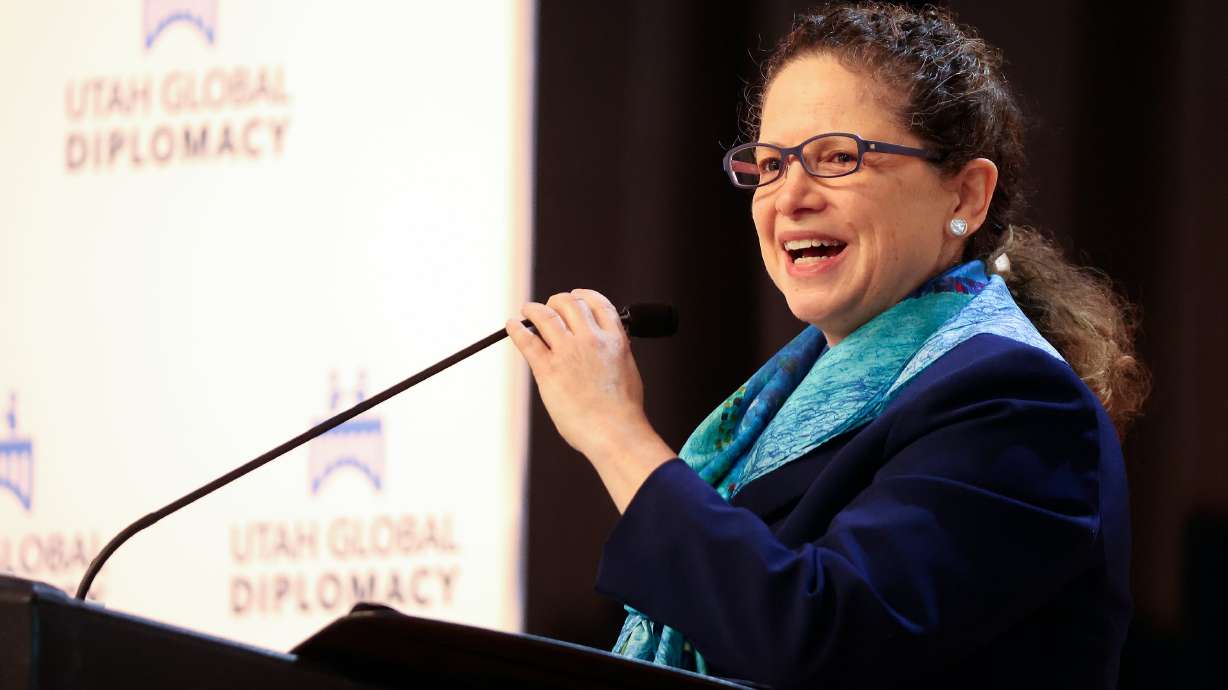Estimated read time: 5-6 minutes
This archived news story is available only for your personal, non-commercial use. Information in the story may be outdated or superseded by additional information. Reading or replaying the story in its archived form does not constitute a republication of the story.
SALT LAKE CITY — Last year on Oct. 4, Rachel Miner had a flight planned to Israel. She was going to see her two friends Yael Admi and Reem Hajajreh. Admi and Hajajreh had jointly planned a march for peace — Admi is a leader in an Israeli women's peace organization and Hajajareh is a leader in a Palestinian women's peace organization.
Miner felt uneasy about making the trip. As the founder and CEO of Bellwether International, a group that responds to genocides with humanitarian aid, she said, "I've traveled to a lot of scary places. I work in genocide communities, but for whatever reason, my spiritual intuition was to not go."
Three days later, Hamas attacked Israel, killing more than a thousand Israelis, including women and children. Miner was supposed to stay at her friend Vivian Silver's home. Silver was abducted by Hamas and later confirmed dead.
"I was beside myself, not really sure how they were going to build peace," said Miner.
Miner told this story at a symposium held Thursday in West Valley City, called "Bridging Religious Divides: Women's Role in Building Bridges." Sponsored by Utah Global Diplomacy and Bellwether International, the event brought together women of different faiths to discuss what women can do to cross religious divides and build peace.
Admi and Hajajreh continued to link arms in their calls for peace, said Miner. "They're still standing in complete solidarity across religious divides, across political divides, across geographical divides."

The two women were planning on being at the conference, she said, but they could not attend. Instead, they had a video message to share. Hajajreh and Admi sat side by side and shared their hopes for peace, that no more mothers have to bury their children amid a war.
They clasped hands as Admi recalled their joint pact for peace known as "The Mother's Call." It is a call for a resolution to the conflict, asking people from both Israel and Gaza to support the end to violence.
"We join hands in determination and partnership to bring hope back to our peoples," said the pact.
Applause and some whispered amens filled the room. The symposium was mostly attended by women from different walks of life and different faiths. Speakers included Karima Bennoune, from the University of Michigan, Valerie Hudson, from Texas A&M School of International Affairs, Debbie Almontaser, from Bridging Cultures Group Inc., and Mariah Mercer, from the U.S. State Department.
"Why does this matter right now?" asked Miner at the beginning of the symposium. She said women across the world are engaged in building peace in conflict. There are a couple divides the slew of speakers would try to address — how people of faith can build bridges with people of different faiths. And also, how do we bridge divides on a more local and personal level?
That's what it means to bridge the religious divide ... It requires that you show up, that you stand up, that you speak out, especially for people who look, sound and worship differently than you.
–Rachel Miner
Hours after the murder of multiple young girls in the U.K., Miner said the man accused of murder was mislabeled as a refugee.
"The next day, mosques' windows were smashed in. Mosques were vandalized. Jewish and Muslim shops both were ransacked. There was a huge spike in crime," said Miner. "And for a moment, it looked pretty dark."
But local members of the community formed a circle around a mosque, so other community members could pick up the broken glass. Local residents showed up with signs saying refugees are welcome.
"That's what it means to bridge the religious divide and that's what it requires," said Miner. "It requires that you show up, that you stand up, that you speak out, especially for people who look, sound and worship differently than you."
Women waging peace
"We're living in an era characterized by a resurgence of dangerous international armed conflicts, all of which have a terrible impact on women in many regions," said Bennoune. She is a professor of international law at University of Michigan Law School. She also has served as the United Nations special rapporteur in the field of cultural rights from 2015 to 2021.
More countries are involved in conflicts than they have been since the end of World War II, she said. Describing it as a moment to reflect carefully on how people can respond, Bennoune said we are witnessing an "extreme repression of women's rights" while being told those countries are at peace.
As the international community fails to address these problems, said Bennoune, this is the most important time for women to wage peace.
"The right to peace is primordial," she said. "And it is vital to secure all other human rights. But it has to be imbued with more than platitudes to be meaningful in women's lives. It has to be aright that actually offers a remedy in situations that pose grave threats to women's lives and women's equality."
Bennoune focused on her work with women in Afghanistan, saying she has learned any meaningful sense of peace needs to be accompanied by a robust protection of women's rights — otherwise, it is not peace.
Peace does not involve just not being engaged in a war. She said there also needs to be a sense of social peace where people are free from fear their government will come to their homes and accuse them of something at any moment.
"I've thought about this again and again since 2021 when the Taliban returned to power," said Bennoune.









